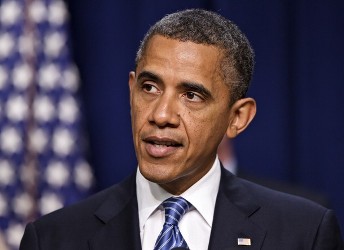South Sudan Kiir “apologises” to US Obama for denying his support to Sudanese rebels
August 4, 2012 (LONDON) — South Sudan President Salva Kiir wrote “an apology letter” to his U.S. counterpart Barack Obama explaining why he denied to him twice that Juba was supporting rebels in neighboring Sudan, a major US publication reported last week, citing a former official.
 US officials previously and publicly demanded that Juba stops its alleged support to the Sudanese rebel groups fearing that such behavior would poison the already strained relations between the two countries and lead to an all-out war that would affect regional stability.
US officials previously and publicly demanded that Juba stops its alleged support to the Sudanese rebel groups fearing that such behavior would poison the already strained relations between the two countries and lead to an all-out war that would affect regional stability.
The issue of Juba’s alleged support to Sudan people’s Liberation Movement – North (SPLM-N) rebels was raised twice by President Barack Obama personally with his South Sudanese counterpart, but Kiir lied on both occasions, reported McClatchy, one of the largest US newspapers group, last Thursday.
“The problems began the first time the two leaders met, on the sidelines of the annual U.N. General Assembly meeting in September,” the McClachy said, citing a former US officials on the condition of anonymity. The second time was “weeks later, during a follow-up phone call that was arranged to move past the September meeting.”
The White House was angered by Kiir’s persistent denial as Washington played an important role in securing the referendum on self-determination in South Sudan and backed the new nations up to the declaration of independence on 9 July 2011.
The American Administration had “strong intelligence” about the support that Juba is providing to the rebel groups, the report said.
Following the telephone conversation where he denied once again his support to the Sudanese rebels, Kiir later sent “an apology letter” to Obama, as described by McClachy’s source.
“In that letter, Kiir wrote that he did know about his military’s support to the Sudanese rebels, but he could not admit that to Obama because his advisers were in the room and they did not know he was aware of that support. Kiir said he was working to lessen the support” the paper said.
In a background briefing on the current African tour of U.S. Secretary of State Hillary Clinton on Saturday 4 August, a senior State Department official said the issue of Juba support to rebel groups was raised by Hillary Clinton during her meeting of this week with President Kiir.
“The Secretary addressed it and encouraged there be an effort to resolve these kinds of issues,” the senior official said under the cover of anonymity.
He further said that “Salva Kiir did tell the Secretary that he wanted to be helpful to the government in Khartoum in helping them deal with the political issues in South Kordofan and Blue Nile and that he recognized the importance of having a stable and peaceful neighbor next to him.”
The senior official emphasized that they also asked Khartoum, which has bad relations with Washington, to stop its support to proxy groups fighting against Juba government.
In November 2011, the White House Deputy National Security Adviser Denis McDonough flanked by Sudan’s special envoy Princeton Lyman visited Khartoum and Juba to demand to the two parties to stop backing rebel groups.
The negotiating teams from the two sides will meet next September to discuss the implementation of security arrangements and particularly a buffer zone that Khartoum refuses to operationalise unless the mediation removes a location called “Mile 14” from a map it proposes to establish it.
The rebel SPLM-N is also expected to engage political talks next month with Khartoum. Regional and international observers believe that the South Kordofan conflict complicated the settlement of unresolved issues between the two countries.
South Sudan’s ruling party, SPLM, seems more concerned by the fate of their former comrades of the SPLM-N despite its alleged support to Darfur rebels. The latter formed an alliance with the former and both demand a comprehensive process to discuss Darfur, Blue Nile and South Kordofan issues.
(ST)
